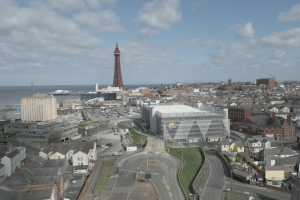Liverpool Waters application unlikely to submit before September

PEEL Group development director Lindsey Ashworth has said that the property giant will have to consider its options regarding the future of the Liverpool Waters scheme if English Heritage decides to raise a formal objection to the project.
Ashworth said that Peel and its partners had been working with both the Design Council and English Heritage for several months with a view to addressing objections to its proposals for the £5.5bn, 150-acre office-led development.
He added that although he was confident of reaching agreement with the former, he was unsure about the prospect of finding enough common ground with English Heritage.
“It’s put us back by around 12 months,” he said.
Ashworth said that the organisation, which exists to protect historic buildings, had objected to tall buildings at the Liverpool Waters due to its proximity to the city’s World Heritage Site but was also against too much excavation below ground due to the potential archaeological impact.
“Being in a public inquiry is not something we want to do,” he argued. “We want to be investing in the site and not be paying fees to lawyers and barristers.”
He argued that the existing usage of the land on the proposed site was “not good”, with much of the site either standing vacant or fulfilling low-value use as yards for scrap metal merchants, for instance. He also said that Peel had pledged to preserve “every historical element” of the site.
“They are the only people with any objections,” he added.
Speaking to TheBusinessDesk.com ahead of a special city-region supplement outlining plans for the city-region’s Enterprise Zone, Liverpool City Council leader Cllr Joe Anderson said that a planning application for the project was unlikely to be heard by the council until September.
“It takes time and it depends on Peel,” he said. “We’ve been frustrated by English Heritage and by the Design Council, who have been slowing up the Liverpool application.
“In my view, they’re over-egging their objections because the people of the city are looking to see something built. They have a role to play in the process, of course, but they also have a duty to consider the wider economic element.”
A spokeswoman for English Heritage said: “We’re absolutely in favour in principle of the regeneration but we’re concerned about the scale of development and its potential impact on the World Heritage site.
“We’re still in talks with the city council and Peel to try and resolve the situation and gain what we’re sure will be improvements.”
The organisation commissioned a report into the Liverpool Waters development which concluded last month that the current proposals would have a “harmful effect” on the city’s heritage, as it would divorce two elements of the World Heritage Site when viewed from Waterloo Dock and Collingwood/Stanley Docks.
English Heritage also said that proposed underground parking would damage the dock’s archaeological remains – “the technical innovation of which is one of the main reasons why Liverpool is a World Heritage Site.
It added, however, that it believed the development could “take place in a way that protects Liverpool’s outstanding heritage, and is committed to working as hard as it can with the Council and Peel to achieve this objective”.








